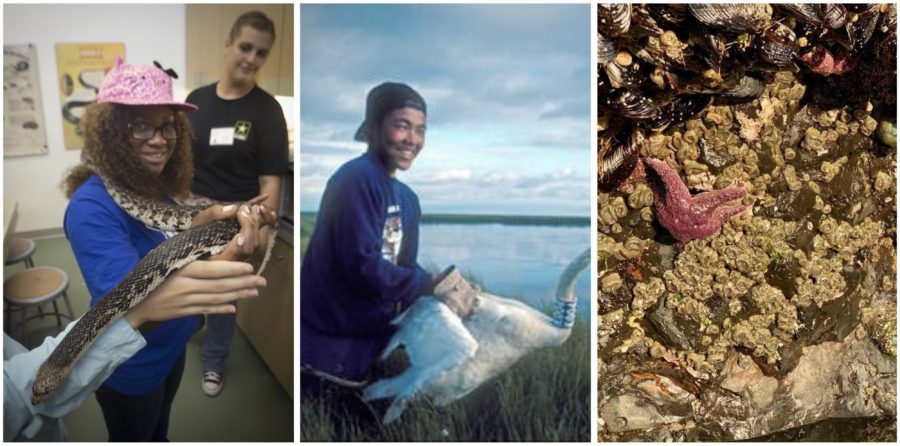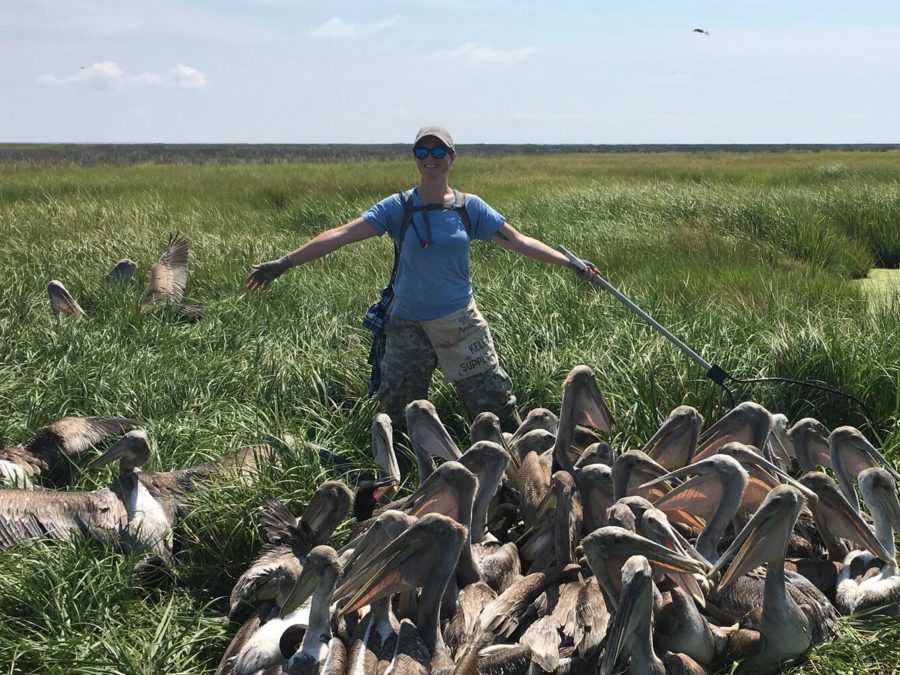ESA-USGS Cooperative Summer Fellowship Program
Due to the federal hiring freeze, no positions will be offered for the ESA-USGS Cooperative Summer Fellowship Program in 2025.
 The Ecological Society of America is pleased to partner with the US Geological Survey to offer summer internships to outstanding field-trained undergraduates for whom the experience would be transformative. Students may ONLY be nominated by faculty who teach or direct field courses or field programs equivalent to 40 hours of biological field research training or other qualifying course or program.
The Ecological Society of America is pleased to partner with the US Geological Survey to offer summer internships to outstanding field-trained undergraduates for whom the experience would be transformative. Students may ONLY be nominated by faculty who teach or direct field courses or field programs equivalent to 40 hours of biological field research training or other qualifying course or program.
If you are a student nominated for this internship, please watch for an email from USGS regarding your status in November.
Questions? Please contact careers@esa.org
Federal Agencies Want Your Students
Federal agencies WANT students! Experiences of the USGS-ESA Cooperative Summer Internship program. Faculty from Minority-Serving Institutions are especially encouraged to nominate students. These are paid summer internships. Don’t let travel and housing be an issue. There are virtual positions available!!
Past Research projects and Intern sites
2024 Summer Fellowships
2023 Summer Fellowships
2022 Summer Fellowships
2021 Summer Fellowships
Directory of Field Courses and Programs
A directory of field courses and programs that nominated students last year are now available. ESA regularly receives requests for information about field courses and programs. With your nomination, you will be asked to describe the field course or field program completed by the student you nominate. Information submitted will be included in this directory next year. At this time, we will only accept information about *qualifying field courses or programs that also nominate students for this internship.
Eligibility and Criteria for Nominations
The ESA-USGS Cooperative Summer Fellowship Program was established in 2018 to complement the USGS longstanding NAGT/USGS internship program. The agency is seeking undergraduate students trained in biological or ecological field methods. The USGS is the science arm of the Department of the Interior. The agency has 8,000 employees across all states and territories and mission areas in ecosystems, environmental health, water, and climate, as well as the traditional geologic areas like natural hazards, energy, geology, and minerals. Field biologists study plants, animals, bugs, and ecosystems. The agency is seeking to create a pathway whereby students with excellent training in biological field methods can be nominated and apply for summer internships at USGS. Selected applicants will be offered internships at available field, laboratory, or office related scientific positions throughout the country for up to 5 months. USGS places interns wherever the project scientists need them. Some internships may be conducted remotely.
We are particularly interested in providing opportunities for students for whom an internship is a unique opportunity, and could help propel them toward a professional path. ESA and USGS are committed to diversity and inclusion. We especially encourage field course and program directors to nominate students from underrepresented communities in ecology.
Please see details that follow.
More information about the USGS internship programs is available here.
Process for Student Applications
- Students must first be nominated by faculty or directors of field training courses or experiences. Interested students who are currently enrolled in or have completed a *qualifying field course or program within the last six months should contact the faculty or director of the field course or program.
- Only faculty teaching a field course or the Director of a Field program may submit nominations of students who have completed that field course or field program. Please do not nominate students who completed a course that you have not taught or a program you did not direct. You will be asked for information of the course or program your students attended.
- ESA forwards nominees to USGS.
- USGS invites selected nominees directly to apply for available summer/remote internships.
- If invited to apply, nominees will be using the USAJOBS website to submit application materials, including a résumé, cover letter and unofficial transcripts.
- Students will be interviewed for several projects and can rank their choices. USGS scientists make the final selections.
See below for information about qualifying field programs and eligibility of students

Melissa Roach, biologist with the Patuxent Bird Banding Lab, keeps pelican chicks that are waiting for banding from sneaking away into the marsh on Smith Island in Chesapeake Bay.
*Criteria for Qualifying Field Training Courses or Programs and Student Nominations
The following experiences may qualify as excellent field training:
-
a 4-6 credit hour course, taught in the field in which students learn to make observations, collect and analyze data. An average of 40 hours of field training is expected.
- a series of lab experiences across multiple courses that together may add up a 4-6 credit hour course; or
- a research experience of 10 or more weeks where the student participates in field research.
Examples of field skills involved in internships may include (this is intended to be illustrative only):
- Identification of plants, vertebrates and invertebrates, microorganisms
- Physiological field measurements (in situ photosynthesis, respiration, water relations etc)
- Population assessment (quadrats, transects, mark-recapture etc)
- Community level assessment (measuring density and diversity etc)
- Ecosystem process field assessment (carbon or nutrient flux, whole system metabolism, watershed studies etc)
- Assessment involving two or more trophic levels
- Soil analysis (e.g. moisture, organic matter content, texture, functions etc)
- Use of and/or ground truth remotely sensed images (e.g. GoogleEarth, NEON etc)
- Water analysis (physical and biological measurements, flow etc)
Note that, consistent with USGS core values and the ESA Code of Ethics, courses and programs that nominate students are expected to have an enforceable code-of-conduct regarding sexual harassment and bullying in place for their field programs within their own institutions or organizations.
Eligibility of Student Nominees
- USGS is particularly interested in promising students for whom the experience could be transformative.
- Nominees must have completed a *qualifying field course or program within the last six months.
- Nominees must be US Citizens.
- Nominees must be an undergraduate at the time of nomination. Those with May graduation dates are still eligible.
- Nominees should be comfortable with field conditions such as strenuous walking, carrying heavy loads, and adverse outdoor conditions.